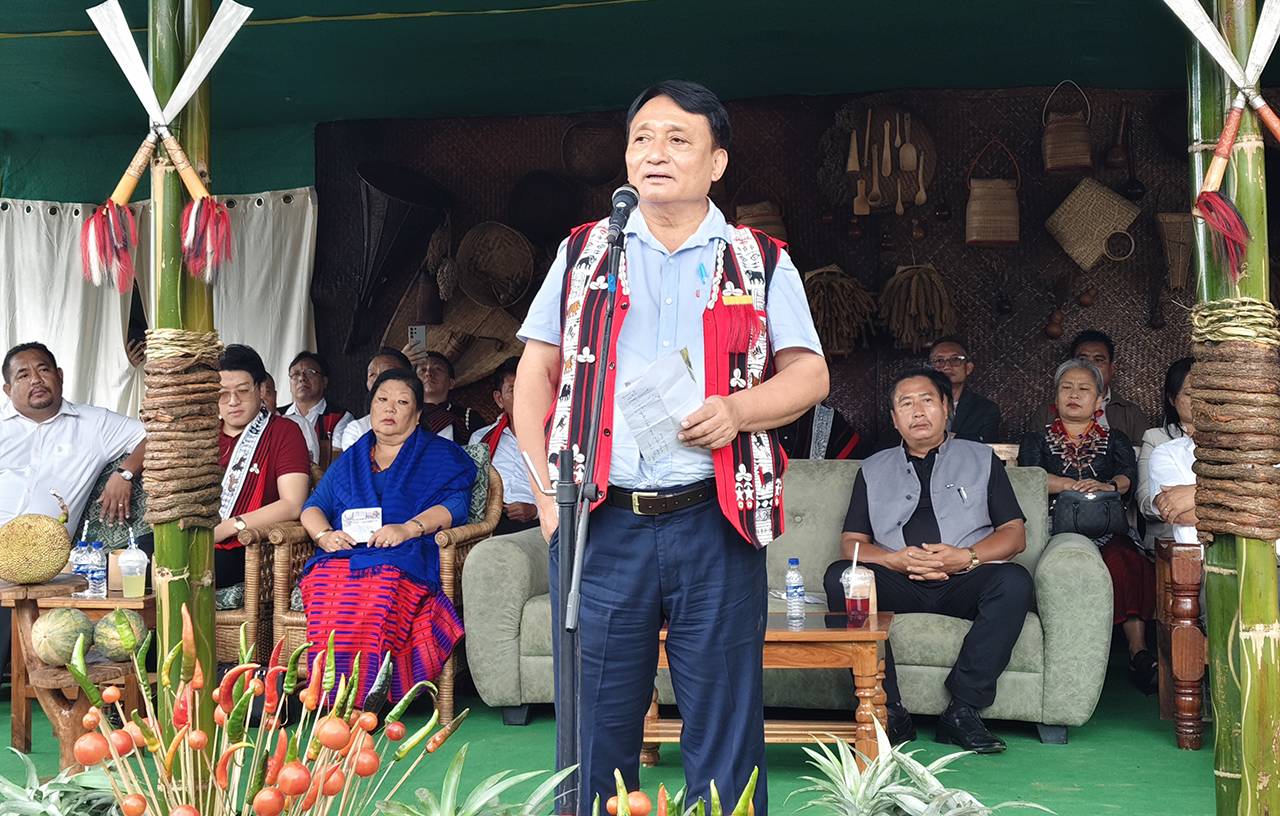Tsarü Village celebrated the Tsang-Rii Mübü Thüpcheh on August 14 at the Tsarü Village Community
Hall, with Minister for Rural Development & SIRD, Metsübo Jamir, as the Special Guest, and Sethrongkyü Sangtam, Advisor for Information & Technology, Economics & Statistics, and Evaluation as the Guest of Honour.
In his address on the occasion of pre-harvest Tsang-Rii Festival, Metsübo announced several developmental initiatives for Tsarü Village (Chare Village). These include the establishment of a Panchayat Learning Centre for the youth, a ₹50-lakh piggery farming initiative for women, and the construction of approach roads in and around the village, while also hinting that Hon’ble Advisor Sethrongkyü Sangtam would look into the main road.
He further informed that the Detailed Project Report (DPR) for the Meyilong–Chare road might be nearing completion, and he hoped the work to commence soon.
On the special occasion, Jamir extended his greetings to all and expressed deep personal and historical ties between Longsa Village, his native place, and Chare Village. He recalled that Chare was his late father NI Jamir’s favourite village after Longsa, describing his presence at the festival as “harvesting the fruits of a long-standing bond” between the two villages.
He praised God for the relationship that was nurtured in his father’s generation and continues today, noting that his father had become like one of Chare’s own. “During my father’s time, the trust and relationship built between our villages has led us today to celebrate together as Longsa and Chare,” he said.
Addressing current issues, Jamir spoke on the Frontier Nagaland Territory (FNT), stressing that it should not be misunderstood as a movement for separation. “Whether FNT comes or not, we will remain together as Nagaland,” he said, explaining that FNT is about understanding and working together, not creating a separate state or region. He reminded the gathering that Nagas have long been spread across
Nagaland, Manipur, Assam, and beyond during India's independence and Nagaland statehood and likened FNT to an examination that teaches the importance of valuing, loving, and understanding one another, while sharing responsibilities and burdens.
Download Nagaland Tribune app on Google Play

Encouraging the gathering, Jamir urged them to be good, courageous, and never forget the contributions of their “parents referring to the elder generation communities who had supported their community. “Let our love for each other remain strong, and let us never leave one another. Let us remember how far we have come,” he concluded, calling for stronger bonds and unity among the people.
In his brief address, Sethrongkyü Sangtam, said that while the Tsang-Rii Festival is traditionally a pre- harvest celebration seeking blessings for a bountiful yield, its significance in the present generation should go beyond agriculture. He urged that, just as blessings were once sought for farmlands, today’s generation should seek God’s blessings for understanding, achievements, and success in all spheres of life.
Emphasizing unity, he called upon the gathering to use such festivals as an opportunity to strengthen bonds, avoid disunity, and nurture a spirit of goodwill, where true blessings are found.
Short speeches were delivered by L. Nungshi, Head GB; and Zerutso Kesiezie, Extra Assistant Commissioner, Chare, Tuensang District, Nagaland.
The welcome address was delivered by I. Mendang Sangtam, Council Chairman of Tsarü Village. The celebration featured a range of cultural presentations, including a Folk Fusion performance by
Chubatula and Thrijungli, Müsho Khi by Imtila and Thsadongla from Chare Town, and the Tsang-Rii
Mübü Yukhe presented by Changse Head Barrick. Tsarü New Village Council showcased Mihlahlahba, while the Tsarü Cultural Troupe performed Nyichinung.

